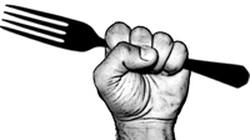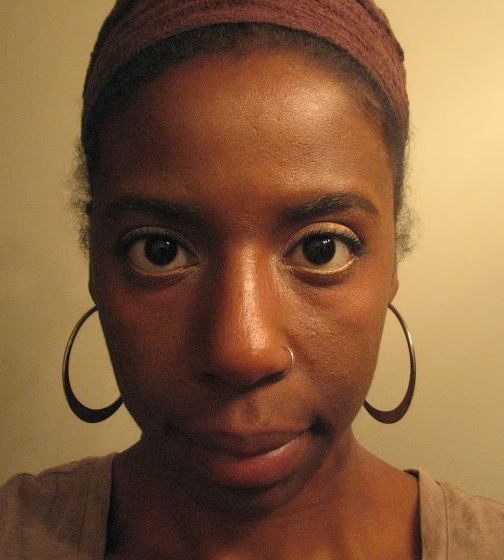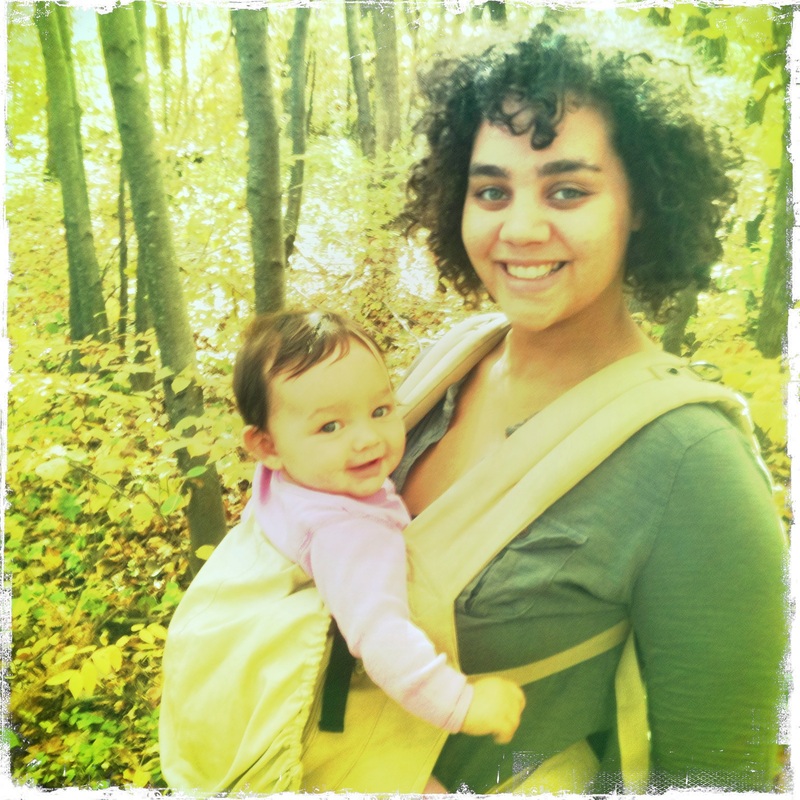 Autumn’s note: As a part of editing one of my previous blog submissions, Nekeisha and I had a dialogue about whether or not to include an anecdote about my personal meat-eating practices. It was in this dialogue that I learned about her deep political and spiritual commitment to veganism. That dialogue led me to invite Nekeisha into an intentional exchange in which we would question each other about the political and spiritual dimensions of our food choices, and each take space to more fully and deeply explore the journeys that have brought us to similar political realities, but very different food choices. Here is Part 1 of our exchange. Autumn: Some of our readers may not realize that veganism can be a politically motivated lifestyle choice. Nekeisha, can you share some about your experience of becoming vegan? What inspired you to make this choice and how is it a manifestation of your politics? Nekeisha: First, I think the phrase “becoming vegan” really fits my own journey because it acknowledges that the transition is an ongoing process and, it names my experience of veganism as something I am always deepening and expanding my relationship to. The journey started for me at Wake Up Weekend, an animal advocacy and awareness raising event in Grand Rapids, Mich. There, I was confronted with lots of information I didn’t know and met lots of committed, compassionate people who were interested in seeing other animals as co-creatures with us instead of “its” for our indiscriminate use. If I had to name the two things that really compelled me to take veganism seriously, it would be the emotional response I had to seeing the unrelenting violence other animals undergo in the factory-farming system and seeing how my dairy- and egg-eating was connected to a meat-making system I thought I was avoiding by “only eating fish.” The shift to seeing veganism as a personal practice with more political implications came when I started awakening to the oppressive ideological construct—theological, social, scientific, etc.—that privileges “humanity” (usually males) over “the animals,” that deny our physical, emotional, theological and ecological kinship with other creatures, and that ultimately reduces other animals to human resources, be they food, ingredients for various products or science experiments. I am seriously grateful to feminist-vegetarian thinker and practitioner Carol J. Adams, (her book The Sexual Politics of Meat is amazing) and Marjorie Spiegel who explored the overlap between “animal husbandry” and the chattel slavery system in the US in her book The Dreaded Comparison: Human and Animal Slavery. They helped me see the intersections between what we do to other animals and what we inflict on each other through racism, sexism/patriarchy etc. My veganism extended from avoiding factory-farms, which is an important political act in and of itself, to living out the gospel of liberation and extending anarchist resistance and imagination to include other members of creation. In as much as critiquing domination and injustice is political, then veganism is very political. Nekeisha: One of the things I am intrigued about hearing from you is how you see consuming flesh-foods in relation to your political stances and practices. I know from our previous e-mail exchange that you have not made this choice lightly or unthinkingly. So it makes me curious to know how you see meat-eating and meat-making in relation to your theological, social and/or political commitments? Autumn: Great question! As an Anarchist Catholic, I make most of my life choices from the perspective that all life is sacred, that we exist in a broad ecology of interconnectedness, and that this broad ecology has a death/life cycle that is so powerful, so inclusive, and so much greater than what we can comprehend. I am always seeking to honor both the sacredness of life as well as the sacredness of death. Because death is a critical part of global ecology – in some ways, the very fuel of ecology –death for food is a core part of the life cycle, too. For me the comfort with meat-eating, meat-making, and flesh foods from a political standpoint has been about becoming comfortable with confronting death and accepting death as a necessary part of the cycle. Out of this comes the question of my social responsibility, which I take very seriously. If I believe (as I do) that meat consumption is an important part of the human diet, that we are evolved and designed to eat meat at least some of the time (though not nearly as much as Americans tend to!), but I also believe in honoring the sacredness of the death/life cycle, then what is the best way to do that in a society that has industrialized it’s consumption of meat and completely distanced itself from the reality and necessity of death in order for meat to be on the plate? For me, the answer so far has been to directly involve myself in the decisions related to animals being killed for my consumption. Right now I have a chest freezer full of beef from a cow that was born and raised locally, grass fed and humanely treated; wild game birds that were hunted and dressed by my husband; wild Alaskan salmon and halibut caught and cleaned by my father- and brothers-in-law. It’s not a perfect system. On occasion, I still consume store-bought chicken and farm-raised fish. I see myself as being on a path towards greater and greater awareness and responsibility in the death/life cycle. I also try to hold myself just as accountable around my choices with other food, because I am aware that any participation in the industrialized food system requires reliance on exploitative and shameful practices – for instance, consuming a tomato bought in almost any store in the country means participation in human slavery. For me this goes back, again, to the part we play in a global ecology of sacred life. I believe it is no more acceptable to exploit non-sentient forms of life than sentient forms of life, but I also do not see the practice of eating meat in and of itself to be exploitative. I believe it is the process by which the meat arrives that is exploitative, and so I seek a practice of eating/consumption that avoids exploitation at all levels. Autumn:How do vegans address the challenge of participation in a global industrialized food system, especially when many of the foods marketed to vegans in natural and health food stores are not or cannot be raised locally/regionally in North America? In one of our previous conversations, you talked about masking language around meat consumption that enables people to ignore the reality that they are eating a specific body part of a creature that was alive, had a reproductive system, had thoughts, and had feelings. Do you experience any correlation of masking language within the field of vegan foods? Nekeisha: Actually, I think the challenge vegans face when navigating the global food system is essentially the same challenge facing other conscious eaters and consumers, except that I don’t have to worry about the origin of the flesh foods on the market on top of everything else. Take soy-based products for example. Industrialized farming of soybeans has been ecologically disastrous in Brazil where rainforests are being cleared to grow that crop. But soy derivatives can be found in everything from bread and cereal to the inks used to print books and the feed farmed animals are fed. So that is an agricultural issue that everyone needs to pay attention to, vegan or not. That said, I do think that there can be “vegan-washing” in the same way that there is a “green-washing” industry. So masking takes place when the “vegan” boots you can buy for $20 is produced in sweatshops by human animals or the fancy pair of vegan earrings is made in India or the Goji berries with amazing health properties are shipped all the way from China. What I am about to say isn’t true for everyone, but my sense is that when veganism is primarily practiced out of concern for my personal health and individual longevity, instead of being rooted in our broader relationship with other animals (or grounded in theological, ecological and/or anti-oppression ideals), it is easier to become distracted by the latest exotic, expensive vegan super-food or to be unthinking about other related issues. But my husband Andy and I have learned that it doesn’t have to be that way. A few years ago, we began participating more directly in supplying our food by growing an organic garden. And although the stereotype about vegans is that we just don’t want to accept the reality of death or participate in life’s rhythms, we have been able to enter into both through planting and harvesting while maintaining our commitment to other creatures. This year, we won’t be able to garden like we have been, so we are supporting our local CSA instead, which is a different way of remaining in tune with the seasons. I am also blessed that I have a partner in Andy who thrives on being self-sustaining. He learned how to can food for the winter and he can make vegan specialty foods like cashew-based cheese, and soy and almond milks, which helps reduce the need for processed vegan foods (though we don’t avoid those completely). For a while when he was on a wild-edibles kick, he made applesauce and grape juice from uncultivated plants located near our apartment. In conversations I have about veganism and food systems, there often seems to be this assumption that local, organic and vegan are inherently opposed to one another: you can do one, maybe two, but definitely not all. Although we stumble when attempting to balance the three, I have found that they don’t have to be mutually exclusive either. Nekeisha: For my second question, I wonder if I can return to a couple of points you made in your first response. When I think about human relationships to other animals today in the West especially, I don’t see an integrated life and death cycle. What I see is a pyramid in which humans are holding all the cards while nonhuman animals are subject to our technology, our domesticating practices and our will. Given this imbalance of power, which is often exercised for human desire (not survival), it is difficult for me to see how other animals can be killed for food in our Western economic and cultural context without the act being inherently exploitative. Does this imbalance of power factor into your thoughts on the meat-making process? Would you be willing to reflect more on what you mean by “I seek a practice of eating/consumption that avoids exploitation at all levels” in light of this dynamic? Autumn: I will try to respond at all of the different levels I experience this question. The question you raise, about whether or not killing animals for food in our cultural context is inherently exploitative, is a compelling one. Personally, I do not believe that the disruption to the death/life cycle – which is a result from uncontrolled growth and consumption of a comparatively small number of humans on the planet – means that killing animals for food in our cultural context is inherently exploitative. That would depend on making a direct correlation between very different practices for making meat, and throwing the proverbial baby out with the bathwater. On the contrary, I think it is critical that we preserve cultural practices of making meat, such as hunting and small-scale farming with domestic animals, in order to successfully make the transition away from the industrialized food system. Our food system is comprised of many species of animals that have been domesticated for thousands of years such as animals like cows and chickens that never did and never could exist in the wild. Their continued survival depends on our continued cultivation of them. If we have any hope of healing the wounds of the past century of frightening, disturbing, and painfully inhumane factory farming practices, I believe the path lies in returning to our cultural ways of knowing: how to be with the land and how to be with animals in a way that acknowledges the sacredness of their being. Many people in our country—my family among them—still keep generations-old cultural and traditional practices of killing and eating wild and domesticated animals, practices that existed well before the industrialized food system came into being. As one who maintains these practices, I do not think the idea of being co-creatures with other animals on the planet precludes domesticating and eating them. I also do not see pleasure and necessity in opposition with one another when it comes to killing animals for food. I hate to lean on Michael Pollen here, but as he points out in his book the Botany of Desire, it is not always clear who is domesticating who when it comes to the human experience of desire for food: a particular plant or animal being desirable to humans is as much a factor in their survival as ours. And on the pleasure tip, I would be hard-pressed to argue that a cheetah running down a gazelle does not take pleasure in the kill, even though it is undoubtedly killing for survival and almost certainly recognizes that gazelle as a co-creature in its eco-system. In addition, I think it is problematic to assert that all practices of eating meat put the human in the position of holding all of the power. I agree wholly and completely that this imbalance exists within the industrialized food system, and even within small, humane farming cultures, but the same critique does not apply to practices that fall within the natural food system. In any natural system, the predators have certain advantages and the prey have certain other advantages, each advantage impacting the possibility of survival and ensuring that some of both parties will survive to reproduce and continue participating in the system. For example, my husband hunts deer, but the fact that he knows how to shoot a gun does not automatically mean that he can kill a deer. The success of his hunt depends on location, patience, timing, and skill. In the state of Minnesota, deer hunting is only legal for two weeks out of the year. During this time, it is only legal to hunt bucks (adult male deer) unless you have a special license for hunting a doe (adult female deer). Last year, my husband went into the woods almost every day of that two week period, and he did not even see a deer, much less shoot one. The year before, he killed a deer in his first weekend of hunting, and that deer fed our family for a full year. I don’t consider anything in that practice to be exploitative. When I say that I seek a practice of eating and consumption that avoids exploitation at all levels, I am referring both to our sustainable meat-eating and meat-making practices, as well as the fact that we grow between 30-50% of our own vegetables, participate in a CSA and are members of our local food co-op, can and preserve food at the end of each growing season (similarly to your family, these skills were passed on to us by our parents and grandparents), bake our own bread and cultivate kombucha, hunt wild mushrooms, and wildcraft herbs for medicinal use. We do participate in the industrialized food system, and that means that we cannot claim a pure practice, but we are always growing and deepening our awareness and our sense of political and spiritual responsibility to the planet.
|
Disclaimer
The viewpoints expressed in each reader-submitted article are the authors own, and not an “official Jesus Radicals” position. For more on our editorial policies, visit our submissions page. If you want to contact an author or you have questions, suggestions, or concerns, please contact us. CategoriesAll Accountability Advent Anarchism Animal Liberation Anthropocentrism Appropriation Biblical Exegesis Book Reviews Bread Capitalism Catholic Worker Christmas Civilization Community Complicity Confessing Cultural Hegemony Decolonization Direct Action Easter Economics Feminism Heteropatriarchy Immigration Imperialism Intersectionality Jesus Justice Lent Liberation Theology Love Mutual Liberation Nation-state Nonviolence Occupy Othering Pacifisim Peace Pedagogies Of Liberation Police Privilege Property Queer Racism Resistance Resurrection Sexuality Solidarity Speciesism Spiritual Practices Technology Temptation Veganism Violence War What We're Reading On . . . White Supremacy Zionism ContributorsNekeisha Alayna Alexis
Amaryah Armstrong Autumn Brown HH Brownsmith Jarrod Cochran Chelsea Collonge Keith Hebden Ric Hudgens Liza Minno Bloom Jocelyn Perry Eda Ruhiye Uca Joanna Shenk Nichola Torbett Mark VanSteenwyk Gregory Williams Archives
October 2017
|
Search by typing & pressing enter



 RSS Feed
RSS Feed